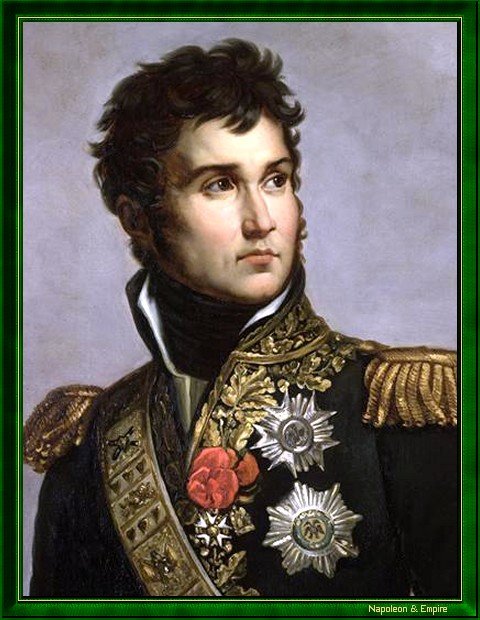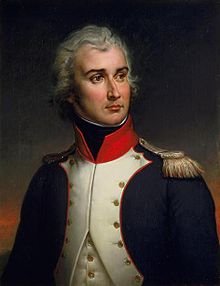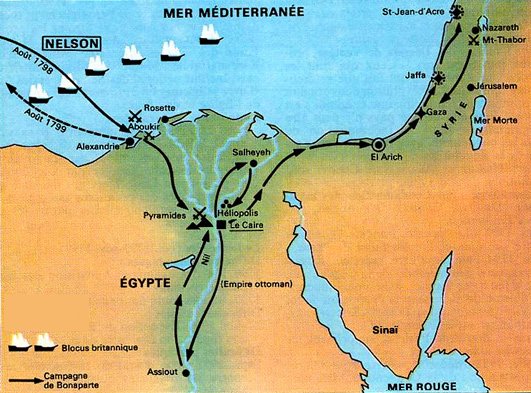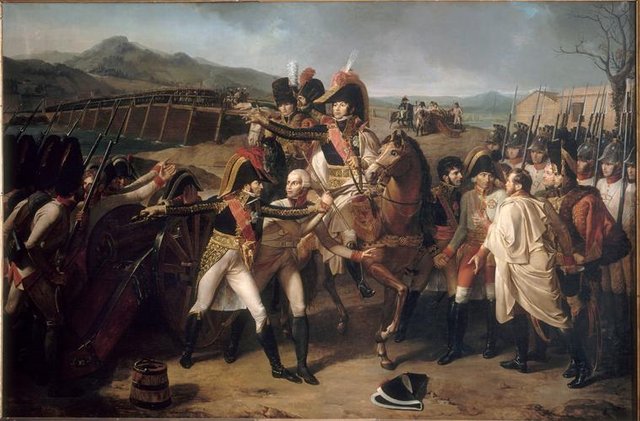GENERALS OF NAPOLEON (19) - LANNES - “The new Roland" (first part)
Jean Lannes was to Napoleon what Roland was to Charlemagne: a brave, daring and loyal (if outspoken) soldier, ready for self-sacrifice, and who had the knack to make the most of every situation against overwhelming forces.
Born in 1769, at Lectoure in the south-west of France, Jean Lannes was the 8th child of a modest farmer. He started very young to work as an apprentice dyer and never received a proper education, something which will stand out later on in his blunt and outspoken manners. When the Revolution breaks out, he volunteers in the department’s regiment.
He sees his first battles against the Spanish armies in 1793, in the Pyrenees. His courage and ability to rally men around him earn him the rank of Captain in October of the same year. After losing his rank due to a political purge, he volunteers for the Army of Italy and stand out at the battle of Loano (November 1795) and later on during a fierce baionnette fight at Dego where he catches the attention of Bonaparte.
[Jean Lannes in 1792] Image credit
Paying of his own person in every fight, it’s him, at Arcole, that saves Bonaparte at the famous bridge, by rushing to his help - even if twice injured. Knocked out by a third injury on the very spot, the one the whole army now calls the “Roland of the Army of Italy” in reference to Charlemagne’s knight, is sent to Milan to recover.
Healed, he goes to Rome in order to pacify the countryside. He is among the first to learn about Bonaparte’s plans about Egypt and entrusted with the logistics of the expedition. Lannes takes part in all the major battles, even if with a peripheral role, earning him the title of general of division. He is again seriously injured at the neck in the siege of Acre and at a leg during the battle of Abukir.
Map of the campaign of Egypt
Back in France with Bonaparte in October 1799, he makes sure that the infantery officers agree to the Coup of 18 Brumaire. Sent to the South-West of France, his region, to control and repress any opposition to the new regime, he shows clemency to political prisoners but not to his wife, who had a child from an extramarital union while he was in Egypt. They divorce.
He is back alongside Bonaparte the following year in the Army of Italy against the Austrians. After taking Pavia on the 3rd of June 1800, Lannes is ordered to pursue his advance, but the surrender of Massena in Genoa suddenly confronts him with a much increased Austrian force. Fighting one against three, Lannes eventually manages to rout the Austrians from the battlefield at Montebello. This first “personal” victory is just the beginning: at Marengo, his charisma is paramount to withstand the onslaught of the Austrians long enough to enable Desaix to smash them into pieces. Bonaparte is aware of it and grants a sword of honour.
Lannes in his Hussard uniform [Image credit]
Back in France, Lannes remarries with a sister of a fellow general, and is made commander of the Consular Guard, but the intrigues around the First Consul will cost him dear. Murat (with whom Lannes was in contention for the hand of Bonaparte’s sister Caroline) reports that the Consular Guard’s budget has been overpassed. Bonaparte asks Lannes to repay the debt from his own pocket and sends him as ambassador to Lisbon to let things cool off.
In Lisbon, Lannes, after difficult beginnings, succeeds in obtaining a neutrality treaty from the Portuguese court favourable to France. Satisfied, Napoleon replaces Lannes by Junot and gives Lannes command in the invasion army of England. But the disaster of Trafalgar bring a change of plan: at the head of the 5th Army corp, Lannes must lead the vanguard of the Grande Armée in Germany.
There, Lannes finds his old nemesis: Murat. The two generals, who come from the same region, could not be more opposed in style. Lannes is more disciplined and has a better foresight than the dashing and brash cavalryman that is Murat. But the two countrymen will eventually surpass their own differences during an incredible episode: the taking of the Danube’s bridge.
After defeating jointly the Austrian rearguard at Amstetten on November 5th 1804, Lannes and Murat press their advantage towards Vienna. There, they encounter a well-defended bridge which is of the highest importance to take the Austrian capital. Tolstoy has described this feat in War and Peace (book II, chapter XII) and I borrow his words:
The surprise of the Danube's bridge. [Image credit.]
"Nothing is truer or sadder. These gentlemen ride onto the bridge alone and wave white handkerchiefs; they assure the officer on duty that they, the marshals, are on their way to negotiate with Prince Auersperg. He lets them enter. They spin him a thousand gasconades, saying that the war is over, that the Emperor Francis is arranging a meeting with Bonaparte, that they desire to see Prince Auersperg, and so on. The officer sends for Auersperg; these gentlemen embrace the officers, crack jokes, sit on the cannon, and meanwhile a French battalion gets to the bridge unobserved, flings the bags of incendiary material into the water, and approaches the tete-de-pont. At length appears the lieutenant general, our dear Prince Auersperg von Mautern himself. 'Dearest foe! Flower of the Austrian army, hero of the Turkish wars Hostilities are ended, we can shake one another's hand.... The Emperor Napoleon burns with impatience to make Prince Auersperg's acquaintance.' In a word, those gentlemen, Gascons indeed, so bewildered him with fine words, and he is so flattered by his rapidly established intimacy with the French marshals, and so dazzled by the sight of Murat's mantle and ostrich plumes, qu'il n'y voit que du feu, et oublie celui qu'il devait faire faire sur l'ennemi!" [...] "The French battalion rushes to the bridgehead, spikes the guns, and the bridge is taken! But what is best of all," he went on, his excitement subsiding under the delightful interest of his own story, "is that the sergeant in charge of the cannon which was to give the signal to fire the mines and blow up the bridge, this sergeant, seeing that the French troops were running onto the bridge, was about to fire, but Lannes stayed his hand. The sergeant, who was evidently wiser than his general, goes up to Auersperg and says: 'Prince, you are being deceived, here are the French!' Murat, seeing that all is lost if the sergeant is allowed to speak, turns to Auersperg with feigned astonishment (he is a true Gascon) and says: 'I don't recognize the world-famous Austrian discipline, if you allow a subordinate to address you like that!' It was a stroke of genius. Prince Auersperg feels his dignity at stake and orders the sergeant to be arrested. Come, you must own that this affair of the Thabor Bridge is delightful! It is not exactly stupidity, nor rascality...."
At Austerlitz, the following month, Murat and Lannes are again uniting their force on the left-wing of the battlefield, with great success this time. However, following this immense victory, Napoleon and Lannes have a violent argument which has never been explained. Lannes has never been shy to speak his mind to his old comrade.
Whatever the cause of this dispute, Lannes asks to be relieved of his command and Napoleon is too happy to oblige.
To be continued...Sources:
http://www.friends-partners.org/oldfriends/literature/war_and_peace/war-peace_b02c12.html
https://en.wikipedia.org/wiki/Jean_Lannes
http://napoleon-monuments.eu/Napoleon1er/Lannes.htm
https://www.herodote.net/Jean_Lannes_1769_1809_-synthese-416.php
http://napoleon1er.perso.neuf.fr/Lannes.html



.jpg)

Nice job this exactly the type of thing that should be on steemit. Informing, knowledgeable and for the intellectual. Upvoted :D keep up the work.
Thanks for the praise! I try to keep it concise and synthetic, but without sacrificing quality.
I haven't followed them all(posts) Herverisson, good stuff, used to know some generals, had a long time interest in 18th century, Napoleon, the battles, naval history, living conditions, music, etc, i don't live to far from Waterloo, still figuring out what Ney just did there.
Good to know I have a fellow history buff with you :) This pet project was first born on Instagram but I found it better to follow it on Steemit, it was much more rewarding and gave me more liberty. The series is almost over now, I have only a couple more of generals in my list, but i'll do a post summing it all up :) thanks again!